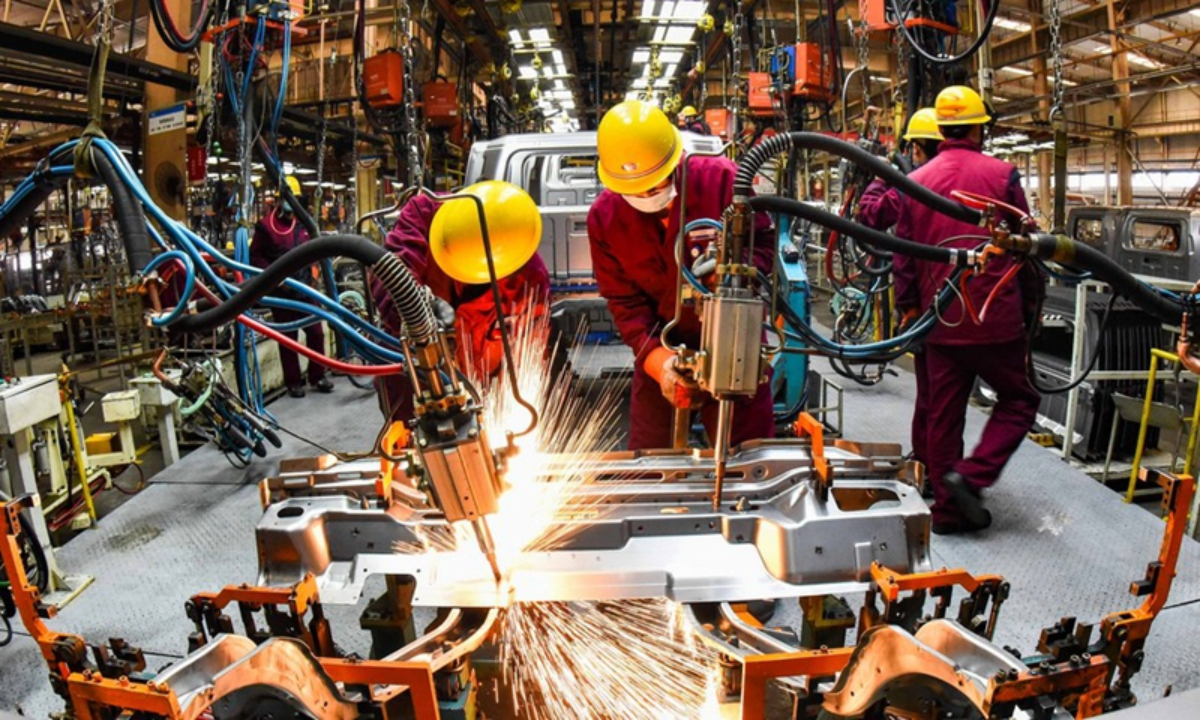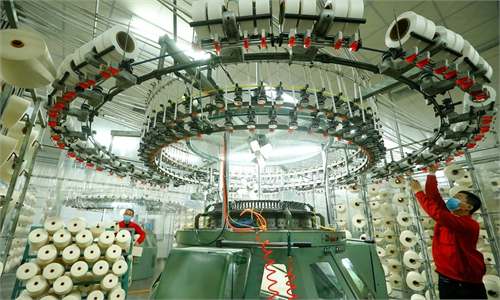
Workers weld at a workshop of an automobile manufacturing enterprise in Qingzhou city, East China's Shandong Province. Photo: Xinhua
China's State Council, the cabinet, on Wednesday held an unprecedented national video teleconference on stabilizing the economy, which was reportedly attended by over 100,000 officials of various levels. The meeting, coming at a time when the Chinese economy is facing significant downward pressure, sent an unmistakable signal that keeping the economy from falling out of a reasonable growth range has become a top priority for the government.
Since March, the complicated international situation combined with the most acute domestic COVID-19 outbreak in two years have sent shockwaves through various Chinese sectors and supply chains, seriously dampening the growth outlook for this year.
The situation has unsurprisingly triggered a new wave of US and other Western media badmouthing of the Chinese economy. One of the relatively prominent attacks came from a recent Bloomberg article entitled "US growth seen outpacing China's for first time since 1976," which claimed that China's economy will grow just 2 percent this year, while US GDP will increase 2.8 percent.
The whole prediction is preposterous and will not happen. Even Bloomberg itself acknowledged that the 2 percent is "on the bearish end of the spectrum, with the median forecast for China's 2022 GDP growth still over 4 percent." Also, the article appears to have deliberately overlooked the fact that the US economy is also facing complicated situation, with various financial institutions seeing the possibility of a US recession next year.
Pessimistic predictions from the Western media about China have never turned out to be accurate, probably because their views about the Chinese economy have been distorted so much by their ideological bias and long-established political position that they are unable to understand the world's second-largest economy.
By comparison, foreign investment appears to be much more pragmatic. It is true that some foreign-invested companies have sought diversification amid the epidemic and geopolitical impact over the past years, but their pace of investing in China hasn't slowed.
After China's actual use of foreign capital in 2021 hit a record high of 1.15 trillion yuan ($170 billion), foreign investment inflows to the country continued to speed up this year. In the first four months of 2022, foreign direct investment into China, in actual use, expanded 20.5 percent year-on-year. And reports from the German Chamber of Commerce in China and the American Chamber of Commerce in China, over 70 percent of German companies and two-thirds of US companies surveyed plan to increase investment in China.
There is no denying that the epidemic outbreak has caused some shocks to economic activities, but it did not hurt the fundamentals of the Chinese economy. China remains to be one of the fastest-growing major economies around the world, with a huge potential for infrastructure upgrading, a massive domestic consumption market, and a resilient manufacturing sector.
In the face of the current difficulties, it is essential for us to not only understand the problems and take quick measures to prevent the economy from losing reasonable growth momentum but also maintain confidence. This is where China's unique institutional advantages come into play.
One of those advantages is that once the problem is identified, the government can mobilize massive, national resources to address it and past experiences tell us that always works out well in the end. Over the past several decades, the Chinese economy faced its fair share of challenges and risks, but thanks to such effective troubleshooting, China overcame all the challenges and rose to become the world's second-largest economy and the biggest trading nation. During that process, China has proven time and again that its ability to stabilize its economic fundamentals is unquestionable.
With the crucial meeting on Wednesday, tackling recent economic challenges has been put front and center and the policy toolbox is open. With various economic stimulus measures that have been and will be introduced and executed, there is every reason to believe that their effects in pulling the economy through the difficulties will soon become felt.
We are confident that by the end of the year, the grim predications made by foreign media outlets about China's economic growth this year, including the very specific comparison made by Bloomberg, will be proven wrong again.



